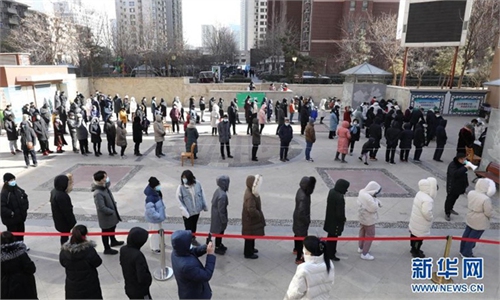Maintaining zero-COVID policy is expensive, but abandoning it will lead to more costly consequences

A resident receives COVID-19 nucleic acid test in Ruili, Southwest China's Yunnan Province on October 29, 2021. The city which shares a border with Myanmar has been testing residents daily this week. Photo: VCG
I have read in several WeChat groups that some are strongly urging China to abandon the dynamic zero-COVID policy and open up as most countries in the world do or plan to do. They assert that since China's dynamic zero-case route will not last long, it will isolate China from the world. It will also lead to the opposition at home.I disagree with them. I would also like to question their judgment of the Chinese public's attitude toward the country's COVID-19 policy. Most people I have met support China's dynamic zero-case policy. All the dissatisfaction is directed at specific measures, not at the route itself.
The dynamic zero-case policy is indeed costly. But if we completely open up the border and stop the epidemiological investigation and tracking down cases as the US does, the consequences will be utterly unimaginable.
People are dissatisfied with some rigid practices in China's prevention and control measures. Yet, if what happened in Wuhan last year happens in the whole country again, the public opposition will only be greater. There will be more problems and more serious losses. I really feel strange that some people just don't realize this. However, it is important to prevent their foolishness from spreading to the whole society.
I would like to remind all local governments to be extremely careful to humanize their measures when exercising the dynamic zero-case policy. We must pay close attention to responses and opinions of the general public. Legitimate demands must be met, and real problems raised by people must be improved.
What I mean is that most countries in the world have indeed opened up. No matter how much price they have paid and how many lives they have lost, the benefits of their opening-up today will be tempting. That temptation is bound to spill over into Chinese society, putting pressure on the dynamic zero-COVID policy. There will be some people and forces for all sorts of reasons and purposes that help build the pressure, which will intensifies the friction around the policy. Then it is likely to explode at some point due to a combination of factors.
As China gradually becomes an "isolated island" in terms of exercising the dynamic zero-COVID policy, its advantages over the open model may decrease gradually. We must strengthen the rationality and accuracy of the dynamic zero-COVID policy. Humanization is really becoming more and more important, and we cannot have any obvious flaw in this aspect. This is of great significance to the smooth implementation of the dynamic zero-COVID route.
In the long run, China needs to accelerate medical science breakthroughs in response to the pandemic to create conditions for China's eventual opening-up. In addition, it is uncertain whether there will be a new mutation of the coronavirus. It is not known whether the US and Europe will suffer a new shock wave of the pandemic. China cannot slack off in any direction. If we do our best, we will take the strategic initiative at every stage.
The author is editor-in-chief of the Global Times. opinion@globaltimes.com.cn



